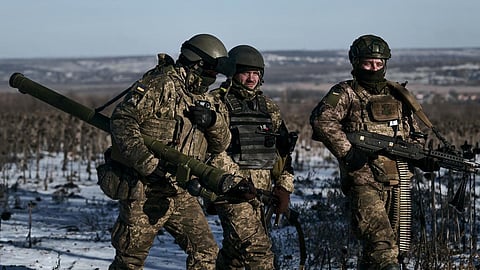

It’s been one year since Russia invaded Ukraine, an act that prompted world leaders to condemn it as a ‘needless show’ of military aggression. The hostilities claimed the lives of over 8,000 non-combatants, and have had a far reaching impact on the geopolitical balance of the world. The prices of food and fuel have skyrocketed, pushing several regions to the brink of economic exhaustion. It prompted NATO to weigh its options regarding onboarding of potential new members like Ukraine, Sweden and Finland, the latter of which also shares a border with Russia.
The expectation of dialogue between the belligerents ended in stalemate as neither side was willing to step down. Moscow has mobilised over 5 lakh troops to be pulled into action, during an expected spring offensive. The number of troops that will be dropped into the battle zone is literally twice as many soldiers who were deployed during the invasion last year. While Ukraine’s allies in the West, most notably the NATO, have desisted from engaging with Russia on a ‘personnel’ level, they have assisted Ukraine with financial and military support — in the form of missile defence systems, precision bombs, battle tanks, as well as armoured vehicles.
In terms of military assistance, the US finds itself on top having made commitments to the tune of $30 bn since the beginning of President Biden’s administration. According to the Kiel Institute, a sum of $115 bn from 46 nations (including NATO pitching in $80 bn) has been directed towards Kyiv in the form of financial, humanitarian and military aid from January to November 2022. This assistance might not keep coming ad infinitum, even though Biden recently pledged the US’s perpetual support for Ukraine.
The US’s announcement fed right into Putin’s hands as he suspended Moscow’s participation in the New START treaty, which led observers to ponder if the two sides are now setting the stage for a nuclear arms race. Meanwhile, China has also declared a ‘no-limits’ friendship with Russia, refusing to criticise the war and offsetting the impact of Western sanctions by purchasing more of Russia’s oil and gas. China has reasons to side with Russia, thanks to its common opposition to the Western alliance, and more specifically, Beijing’s approach to Taiwan, which officials in the mainland have always considered a part of China.
Japanese PM Fumio Kishida recently described the Russian invasion of Ukraine as the complete end of the post-Cold War world, emphasising that globalisation and interdependence by themselves cannot be guarantors of peace and development. Prior to the war, the EU banked on Russia for 40% of its LNG requirements. Having found alternative sources, its dependence is down to 10% which has emboldened EU nations to exhibit a more hostile front to Moscow.
But then, a prolonged conflict would prove catastrophic for Ukraine, which will require further billions in aid and assistance to rebuild the nation. The long-drawn military engagement also risks enveloping NATO into a direct altercation with Moscow, which will be disastrous. It would be foolhardy to wish away the problem as a geographically limited event, as we have seen its impact being felt globally. Considering the factors of international safety and security, those wielding an influence must bring Zelenskyy and Putin to the discussion table and find a means to bring an end to the war swiftly and effectively.
Visit news.dtnext.in to explore our interactive epaper!
Download the DT Next app for more exciting features!
Click here for iOS
Click here for Android